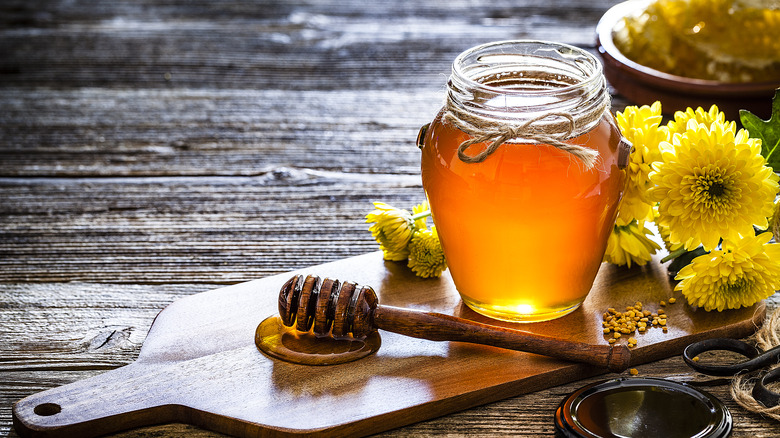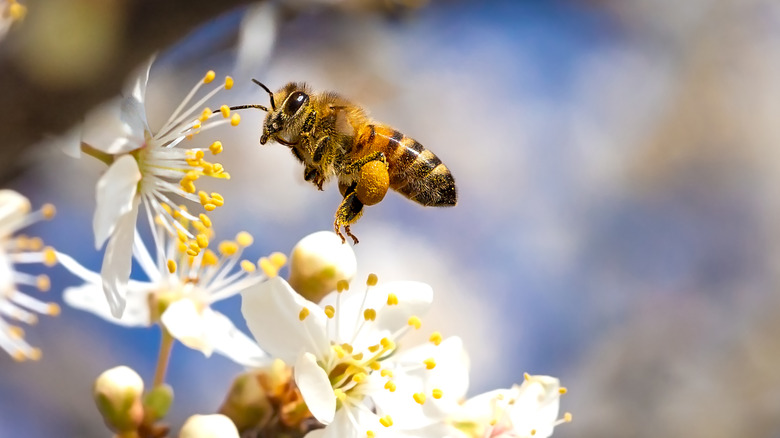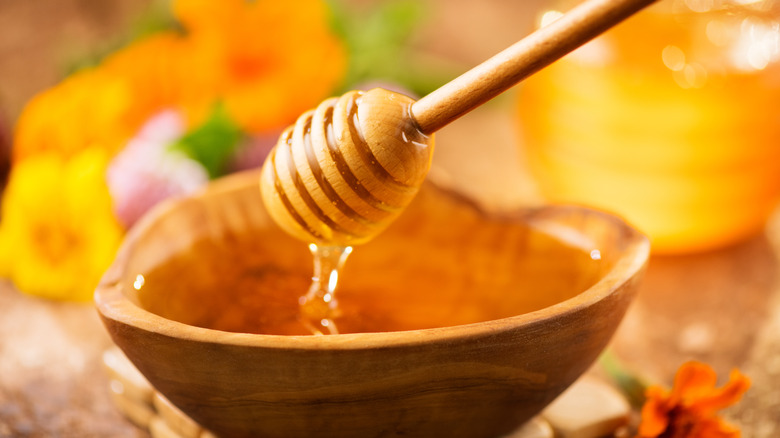Lab-Made Vegan Honey Could Help Protect The Global Bee Population
The syrupy sweetness of honey is something enjoyed across cultures, ages, and even species. Whether it's a human drizzling some on to enjoy fresh figs or a bear risking the sting of bees by dipping their mouth into the hive, no one can get enough of it. As much as we relish the condiment's decadent taste, the threat to honey bees has some food scientists scrambling for other options.
Companies that create vegan honey, like MeliBio, are able to replicate the taste by using nectar from plants and pure sugars. Utilizing the plants that honey bees frequently pollinate – chamomile and sumac, for example — they infuse the natural taste of honey into their lab-made creation. The pure sugars are then combined with the essential compounds in honey to create something that tastes pretty much like the real thing.
Vegan honey can also share the same benefits as actual honey. The Israeli company Bee-io's honey is antibacterial, as well as rich in vitamins and antioxidants. One thing that's different, however, is the lack of toxic compounds, making it safe to eat for babies. While vegans alike can rejoice in this new innovation, vegan honey can also help to benefit the bee ecosystem.
Our reliance on honey bees has consequences
As much as climate change and loss of habitat are a threat to honey bees, the biggest potential harm is what will happen if we continue to rely on honey bees too much. Imagine if your boss poured all their resources into one star employee. Sure, what they bring to the team is great, but if everyone else is suffering, the whole project fails. Honey bees do pollinate a significant amount of plants, but they're not the only ones.
There are over 4,000 types of bee species in the U.S.; native bees pollinate the many crops that are indigenous to the U.S., like blueberries, cherries, and cranberries. Yet, with beekeepers catering solely to honey bees, those other species aren't getting the attention that they need. Brought over from Europe in the 17th century, there are a vast amount of honey bees in competition with native species.
The population of honey bees is almost triple the amount of people in the U.S. and Canada, taking up a lion's share of space. Pollen is plentiful, but in certain areas, the supply is dwindling due to environmental changes. This competition could be a contributing factor as to why some of these native bees are endangered species.
Will switching to vegan honey solve the problem?
Boycotts have often been successful throughout history — by putting your money where your mouth is, you can signal your beliefs to corporations. The honey industry is worth about $8.58 billion worldwide, according to Grand View Research, and a mass exodus to vegan honey may indicate to beekeepers that they should focus on native bees. However, it won't solve the problem of the sheer amount of space that honey bees take up.
Unless you go around personally destroying honey bee hives (which you shouldn't), the population of bees will continue to outweigh that of native species. Although honey bees have been given too much attention, the environmental factors of climate change, parasites, pesticides, and diseases are what heighten this competition. The destruction of bees isn't just due to the overwhelming amount of honey bees, but also the very real threat of bee's homes being destroyed.
It's certainly helpful to avoid buying actual honey as a means to divert attention away from honey bees, but as long as those environmental factors continue, native bee species are still at risk of being endangered. However, for the same delicious taste, you might as well indulge in some lab-made vegan honey as a means of saving the bees.


